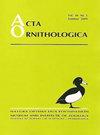Bycatch of Seabirds in the Polish Part of the Southern Baltic Sea in 1970–2018: A Review
IF 1.3
4区 生物学
Q3 ORNITHOLOGY
引用次数: 5
Abstract
Abstract. Bycatch, the unintended capture of animals other than target fish, is one of the most important anthropogenic threats to seabirds worldwide. This problem has been relatively little studied, however. The southern Baltic Sea is one of the three areas worldwide with the highest gillnet bycatch. Forty-eight publications from the years 1982–2021 addressing the problem of seabird bycatch in the Polish Exclusive Economic Zone (PEEZ) of the Baltic Sea were analysed for the purposes of this paper. Twenty-eight bird species were identified in bycatch, 13 of which have threatened or near-threatened status on the European Red Bird List. The magnitude of the annual bycatch was estimated for three periods: 1970s — 47,000 birds, 1980s and 1990s — 39,800 and 2010s — 21,300 birds. The most frequently bycaught species in the 2010s were Long-tailed Duck Clangula hyemalis (9,000 ind. yearly), Greater Scaup Aythya marila (3,500) and Velvet Scoter Melanitta fusca (2,000). Acceptable mortality thresholds calculated using both the Potential Biological Removal (PBR) and the BirdLife International (BLT) methods were found to have been exceeded: for Long-tailed Duck by 175% (PBR) and by 1,061% (BLT); for Greater Scaup by 542% (PBR) and by 3,400% (BLT); for Velvet Scoter by 35% (PBR) and by 495% (BLT). All three species are listed as Vulnerable in Europe. Six distinct bycatch areas have been identified in the PEEZ. Bycatch mitigation is exceedingly difficult to implement: the only effective method currently employed to protect seabirds from bycatch in gillnets involves the temporary closure of bird hotspots to gillnet fishing.1970-2018年波罗的海南部波兰部分海鸟副捕获:综述
摘要副渔获物是对目标鱼类以外的动物的意外捕获,是全球海鸟面临的最重要的人为威胁之一。然而,对这个问题的研究相对较少。波罗的海南部是全球刺网副渔获物最多的三个地区之一。本文分析了1982年至2021年期间关于波罗的海波兰专属经济区(PEEZ)海鸟副渔获物问题的48份出版物。在副渔获物中发现了28种鸟类,其中13种在欧洲红鸟名单上已受到威胁或接近威胁。年副渔获物的数量估计有三个时期:20世纪70年代为47000只,80年代和90年代为39800只,2010年代为21300只。2010年代最常见的副渔获物种是长尾鸭Clangula hyemalis(每年9000只)、大Scaup Aythya marila(3500只)和Velvet Scoter Melanitta fusca(2000只)。使用潜在生物清除(PBR)和国际鸟盟(BLT)方法计算的可接受死亡率阈值被发现超过了:长尾鸭超过了175%(PBR,1061%(BLT,1061%);对于更大的Scaup,分别为542%(PBR)和3400%(BLT);Velvet Scoter分别提高了35%(PBR)和495%(BLT)。这三个物种在欧洲都被列为易危物种。PEEZ中已经确定了六个不同的副渔获物区域。减少副渔获物极难实施:目前保护海鸟免受刺网副渔获的唯一有效方法是暂时关闭鸟类热点,禁止刺网捕鱼。
本文章由计算机程序翻译,如有差异,请以英文原文为准。
求助全文
约1分钟内获得全文
求助全文
来源期刊

Acta Ornithologica
生物-鸟类学
CiteScore
2.10
自引率
0.00%
发文量
14
审稿时长
>12 weeks
期刊介绍:
Publishes scientific papers (original research reports, reviews, short notes, etc.) and announcements from all fields of ornithology. All manuscripts are peer-reviewed.
Established in 1933 as Acta Ornithologica Musei Zoologici Polonici, since 1953 continued under the present title.
Published twice a year by the Natura Optima Dux Foundation under the auspices of the Museum and Institute of Zoology, Polish Academy of Sciences.
 求助内容:
求助内容: 应助结果提醒方式:
应助结果提醒方式:


